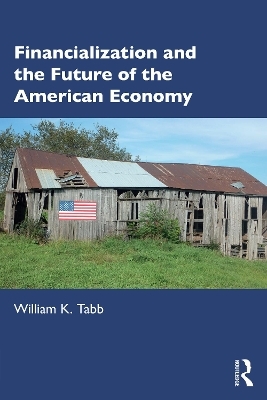
Financialization and the Future of the American Economy
Seiten
2023
Routledge (Verlag)
978-1-032-47246-1 (ISBN)
Routledge (Verlag)
978-1-032-47246-1 (ISBN)
Financialization is a set of processes which has led to a financially-driven and commodified economy with rising inequality, tax avoidance, the lack of investment in infrastructure. This book discusses the causes and costs of financial crises, how financialization produces inequality and instability and the patterns of value extraction.
Financialization is a set of processes which has led to a financially driven and commodified economy with rising inequality, tax avoidance, and a lack of investment in the physical and social infrastructure. Given the influence of money politics, and the secular increase in the burden of debt, financialization has produced a deeply flawed economic system which mainstream economists are unable to address. This book discusses the causes and costs of financial crises, how financialization produces inequality and instability, and the patterns of value extraction it enables. It draws on key theoretical traditions, most prominently the writing of Marx, Keynes, and Minsky that illuminate much that is ignored and rejected in mainstream theorizing, including by many who identify as Keynesians. After decades of low interest rates and years of quantitative easing (QE), keeping borrowing costs near zero, many borrowers – households, businesses, banks, shadow banks, and governments – will not be able to finance their debt at the higher interest rates initiated by central banks to address inflation. The resulting stagflation will be global, producing a severe downturn that may be postponed through still greater debt creation but not avoided by conventional means. The book also explores the ways that standard financial criteria contribute to the climate emergency and the manner in which the commodification of nature proceeds from the desire to create new, marketable derivative products. It concludes with a discussion of what needs to be done to move away from a harmful regime of accumulation premised on financialization and to adopt a far better one. This book is essential reading for anyone interested in the causes and consequences of financialization and its impact on the economy.
Financialization is a set of processes which has led to a financially driven and commodified economy with rising inequality, tax avoidance, and a lack of investment in the physical and social infrastructure. Given the influence of money politics, and the secular increase in the burden of debt, financialization has produced a deeply flawed economic system which mainstream economists are unable to address. This book discusses the causes and costs of financial crises, how financialization produces inequality and instability, and the patterns of value extraction it enables. It draws on key theoretical traditions, most prominently the writing of Marx, Keynes, and Minsky that illuminate much that is ignored and rejected in mainstream theorizing, including by many who identify as Keynesians. After decades of low interest rates and years of quantitative easing (QE), keeping borrowing costs near zero, many borrowers – households, businesses, banks, shadow banks, and governments – will not be able to finance their debt at the higher interest rates initiated by central banks to address inflation. The resulting stagflation will be global, producing a severe downturn that may be postponed through still greater debt creation but not avoided by conventional means. The book also explores the ways that standard financial criteria contribute to the climate emergency and the manner in which the commodification of nature proceeds from the desire to create new, marketable derivative products. It concludes with a discussion of what needs to be done to move away from a harmful regime of accumulation premised on financialization and to adopt a far better one. This book is essential reading for anyone interested in the causes and consequences of financialization and its impact on the economy.
William K. Tabb is Professor Emeritus of Economics Queens College and of Economics, Political Science and Sociology at the Graduate Center of the City University of New York.
1. Introduction 2. The Contemporary Setting and Significance of Financialization 3. The Costs of Financial System Failure 4. Inequality and Financialization 5. Value Extraction and Monopoly 6. The Mainline Tradition and Endogenous Cycles 7. Inflation in the Contemporary Conjuncture 8. Finance and the Environmental Crisis 9. Making the Future: Beyond Financialization
| Erscheinungsdatum | 20.07.2023 |
|---|---|
| Verlagsort | London |
| Sprache | englisch |
| Maße | 156 x 234 mm |
| Gewicht | 453 g |
| Themenwelt | Geschichte ► Teilgebiete der Geschichte ► Wirtschaftsgeschichte |
| Sozialwissenschaften ► Politik / Verwaltung | |
| Wirtschaft ► Volkswirtschaftslehre ► Wirtschaftspolitik | |
| ISBN-10 | 1-032-47246-4 / 1032472464 |
| ISBN-13 | 978-1-032-47246-1 / 9781032472461 |
| Zustand | Neuware |
| Informationen gemäß Produktsicherheitsverordnung (GPSR) | |
| Haben Sie eine Frage zum Produkt? |
Mehr entdecken
aus dem Bereich
aus dem Bereich
Macht und Herrschaft im Zarenreich
Buch | Hardcover (2024)
C.H.Beck (Verlag)
49,90 €
wie die USA und China um die technologische Vorherrschaft auf der …
Buch | Hardcover (2023)
Rowohlt (Verlag)
30,00 €


